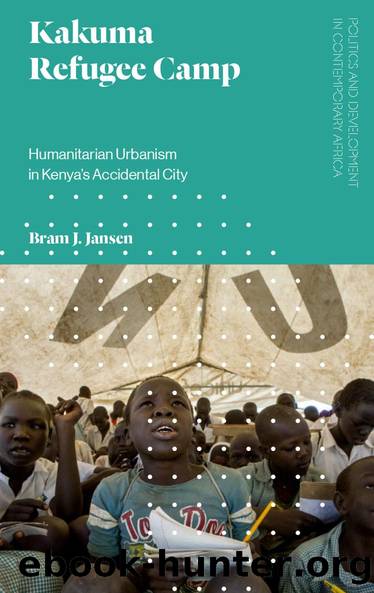Kakuma Refugee Camp by Bram J. Jansen

Author:Bram J. Jansen [Jansen, Bram J.]
Language: eng
Format: epub
Tags: Social Science, Anthropology, General, Political Science, Human Rights, NGOs (Non-Governmental Organizations), Emigration & Immigration, Human Geography, Sociology, Urban, Education, Higher, Developing & Emerging Countries, Disasters & Disaster Relief
ISBN: 9781786991911
Google: 17yrDwAAQBAJ
Publisher: Zed Books Ltd.
Published: 2018-06-15T05:52:23+00:00
Socio-economic stratification
One of the main ideas behind the process of social change associated with urbanism is the diversification of social roles and the emergence of social strata. In his Dadaab study, Agier distinguished between four levels of social stratification in the Dadaab camps: a small group of Somali ânotablesâ; âvoluntary community workersâ; a group of small traders, occasional craftsmen and unofficial employees; and, lastly, recipients of basic minimum aid (food, healthcare, shelter, firewood, water) (Agier 2002: 331â2). Although recognizable, there was a more nuanced picture of social strata in Kakuma, creating relevant socio-economic positions in the camp setting.
For instance, people who receive remittances from abroad on a regular basis, as well as those who live in the camps but are excluded from basic minimum aid, are not represented in this classification. Moreover, a comprehensive analysis should also include forms of non-monetary asset transfer, such as educational opportunities or training beneficial to livelihood creation. I have identified the following social categories in the camp:
â¢Business people: Independent business owners of shops, restaurants and bars, those engaged in trade activities or services requiring some degree of material organization and investment.
â¢Incentive workers: âCivil servantsâ of the aid regime, covering a wide range of types of work as well income scales and secondary benefits.
â¢Employees: Unregulated private sector employment, albeit of a more or less regular nature: waiters, shop workers, tailors, mechanics, bodaboda drivers, cleaners, cooks, etc.
â¢Remittance receivers: People who receive remittances from abroad from relatives, husbands or wives, friends, or through other networks.
â¢Shifters: People who secure an income or other opportunities from Kenyan cities such as Nairobi or Nakuru, who partly shift between their homelands, other locations in Kenya and the camp, in varying family compositions.
â¢The poor: Refugees whose only source of income is aid handouts, and who constitute a type of poor âunderclassâ, analogous to the âurban poorâ. Trading rations or other assets may be a way for this group to gain limited amounts of cash on an irregular basis.
â¢Entrepreneurs: Occasional craftsmen and women who run small home-based grocery shops or prepare food for roadside tuck shops, or who are engaged in weavery, cloth making, stamp making, and so on.
â¢Refugee âelitesâ: People who are able to obtain assets and cash from other sources owing to their status or position of power in the camp, many of whom were already elites in their home countries; while others have positions in the camp in the (unpaid) refugee administration system that allow them certain privileges.
â¢Hustlers, crooks and petty thieves: People surviving on small criminal activity such as theft, stealing, drug trading and gambling schemes.
â¢The dependants: Family members and offspring in the camp who benefit from the resources of their providers. This means that it is important to focus on households, or even extended households, and not only on individuals.
â¢The targeted: People who are part of schemes, funding and other arrangements designated specifically for them, such as the handicapped, illiterate women, the elderly, those who become eligible for microcredit after completing vocational training programs, the insecure, who are given special protection arrangements, or those who are eligible for scholarships.
Download
This site does not store any files on its server. We only index and link to content provided by other sites. Please contact the content providers to delete copyright contents if any and email us, we'll remove relevant links or contents immediately.
The Secret History by Donna Tartt(19090)
The Social Justice Warrior Handbook by Lisa De Pasquale(12190)
Thirteen Reasons Why by Jay Asher(8912)
This Is How You Lose Her by Junot Diaz(6887)
Weapons of Math Destruction by Cathy O'Neil(6281)
Zero to One by Peter Thiel(5802)
Beartown by Fredrik Backman(5755)
The Myth of the Strong Leader by Archie Brown(5508)
The Fire Next Time by James Baldwin(5447)
How Democracies Die by Steven Levitsky & Daniel Ziblatt(5219)
Promise Me, Dad by Joe Biden(5154)
Stone's Rules by Roger Stone(5088)
A Higher Loyalty: Truth, Lies, and Leadership by James Comey(4964)
100 Deadly Skills by Clint Emerson(4926)
Rise and Kill First by Ronen Bergman(4789)
Secrecy World by Jake Bernstein(4753)
The David Icke Guide to the Global Conspiracy (and how to end it) by David Icke(4720)
The Farm by Tom Rob Smith(4514)
The Doomsday Machine by Daniel Ellsberg(4490)
